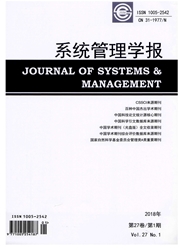

 中文摘要:
中文摘要:
从一类非线性成本库存模型出发,建立了一个生产者一订货商两级易逝品供应链运营的模式。给出了供应链参与各方在无合作、合作及一体化3种模式下的易逝品生产订货模型,并从供应链成员之间的信息共享、决策同步化及动机的一致性等方面对比供应链合作与否的效率差别,比较了3种模式下的供应链总体运营成本,得出了信息共享有助于减少供应链成本的结论。与此同时,通过具体算例对3种模式下的供应链成本进行了比较,验证了结论的正确性。最后,针对供应链中信息共享存在的4个阻碍因素,指出了相应情况下的实现供应链信息共享的途径。
 英文摘要:
英文摘要:
In this paper, we study a two-echelon supply chain of perishable goods with a supplier and a retailer. Due to the perishable nature, our inventory model is characterized with the holding cost nondinearin time. Three scenarios of the strategic interaction of the supplier and retailer are considered, i. e. , noncooperative, cooperative, and centralized decision makings. The efficiencies of cooperation and noncooperation are compared from the perspectives of information sharing, decision synchronization and motivation consistency. Then, we compare the optimal costs of the three scenarios, and conclude thatinformation sharing could help to reduce the costs of supply chain, which is justified through a computational simulation. Finally, we discuss the potential ways to achieve information sharing against thefour obstacles in the process of cooperation.
 同期刊论文项目
同期刊论文项目
 同项目期刊论文
同项目期刊论文
 Literature review of organizational form in biomass supply chain and outlook of research in future C
Literature review of organizational form in biomass supply chain and outlook of research in future C 期刊信息
期刊信息
